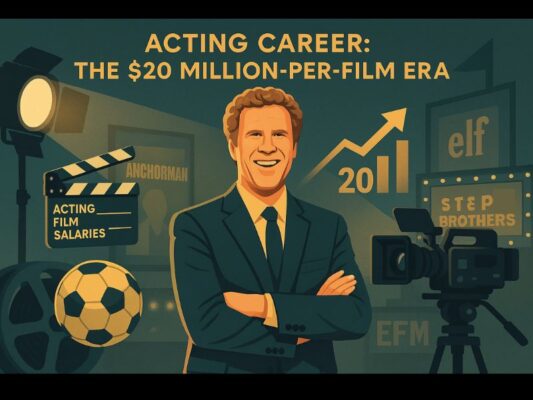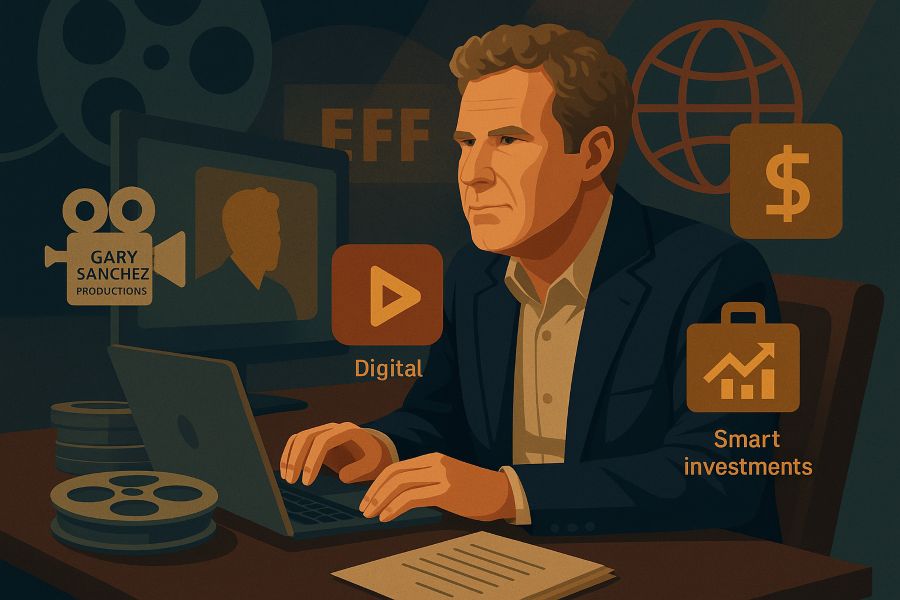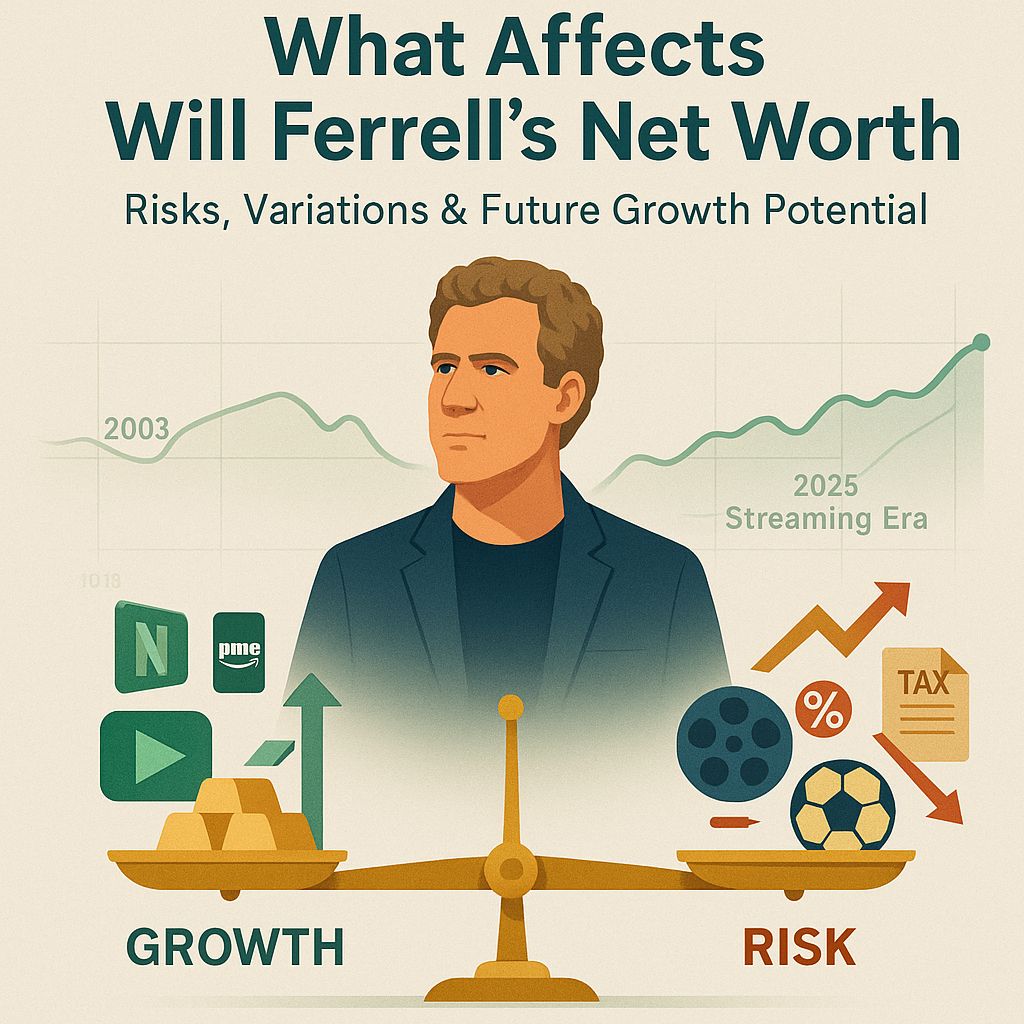Will Ferrell has made a career out of playing lovable idiots but when it comes to money, he’s anything but foolish. As of 2025, the Elf and Anchorman star is sitting on an estimated $160 million fortune, built not just from movie paychecks but from smart producing deals, sports ownerships, and business moves that would make most Wall Street guys nod in approval. He’s proof that comedy, when mixed with strategy and timing, can be one of Hollywood’s most profitable investments. Let’s break down how a guy who once yelled “I’m kind of a big deal” as Ron Burgundy actually became one in real life.
Will Ferrell’s Net Worth at a Glance

Will Ferrell’s net worth in 2025 is estimated at around $160 million, though depending on the source, the number floats anywhere between $120 million and $170 million. That’s the cost of nearly two dozen Anchorman suits, several Malibu homes, and a lifetime supply of cowbells.
But jokes aside, that figure represents nearly three decades of consistent success from his breakout days on Saturday Night Live to box-office hits like Elf, Talladega Nights, Step Brothers, and The Other Guys. Add in producing credits, brand deals, real-estate investments, and a surprising sports-team ownership portfolio, and you start to see why Ferrell’s finances look as strong as his comedic timing.
Here’s a quick snapshot of how it breaks down:
| Source of Income | Estimated Earnings | Description |
| Acting & Film Salaries | $100 M + | From hit comedies, voice roles, and franchise classics |
| Producing & Business Ventures | $30 M + | Includes Funny or Die, production company deals, and backend profits |
| Real Estate Investments | $15 M + | High-value homes in LA and New York |
| Sports Ownerships | $10 M + | Stakes in Los Angeles FC and Leeds United |
| Other Investments & Endorsements | $5 M + | Appearances, ads, and smaller partnerships |
Total Estimated Net Worth (2025): ≈ $160 Million
What makes Ferrell’s fortune interesting isn’t just its size, it’s the balance. He’s not the highest-paid actor in Hollywood anymore, but he’s built a portfolio that keeps paying him long after the punchline fades.
How Will Ferrell Made His Money
Will Ferrell didn’t stumble into wealth by making people laugh but he turned laughter into a full-blown business model. His journey from a Saturday Night Live sketch comic to a $160 million brand is a case study in timing, talent, and taking ownership of your own jokes.
Related: From Janitor to Billionaire: The Net Worth of Tony Robbins
Acting Career: The $20 Million-Per-Film Era

Ferrell’s paycheck evolution is textbook Hollywood. When he joined Saturday Night Live in 1995, he was earning around $7,000 per episode, pocket change compared to what came next. By the early 2000s, hits like Old School (2003) and Elf (2003) made him a global name, and his salary shot up to $20 million per film, putting him in the same league as Jim Carrey and Adam Sandler.
He didn’t rely on sequels or superhero franchises; but he built his fortune on original comedies. Anchorman, Talladega Nights, Blades of Glory, Step Brothers, and The Other Guys. Each delivered solid box-office numbers and long-term streaming royalties.
But here’s where Ferrell showed strong character: he famously turned down $29 million to make Elf 2 because he didn’t like the script. Because he values his legacy over easy cash and ironically, that kind of integrity only adds to his long-term brand value.
Producing & Business Ventures

Ferrell knew the real money isn’t in acting alone, it can also be in the production. Along with Adam McKay, he co-founded Gary Sanchez Productions and later Gloria Sanchez Productions, producing movies and TV shows that extended his reach well beyond the screen.
Then came the digital goldmine: Funny or Die, the viral video platform Ferrell co-created in 2007, became a pop-culture phenomenon and one of the earliest signs that the internet could be monetized by humor, not just cat videos. The platform’s success brought in sponsorship deals and brand partnerships that padded his earnings for years.
Related: Neil Patel Net Worth – Journey from $0 to $100M
Real Estate & Investments
Ferrell’s taste in real estate is as smart as his script choices. He owns multiple properties in Los Angeles, including a luxury home in the Hollywood Hills reportedly worth over $20 million. Real estate isn’t glamorous content, but it’s stable and that’s how Ferrell keeps his wealth grounded (literally).
Sports Team Ownership
In 2016, Ferrell joined the ownership group of Los Angeles FC, an MLS franchise now valued at nearly $1 billion. More recently, he’s taken a stake in Leeds United, the English football club, betting on global sports as his next comedy-proof revenue stream.That’s not just a vanity purchase, because it’s also a stylish way to diversify.
Related: Joe Rogan Net Worth: More Than Just a Podcast
Key Turning Points in Will Ferrell’s Career & Wealth Growth
Every millionaire comedian has a breakout moment, but Ferrell has had several.
His climb from SNL sketch actor to Hollywood powerhouse didn’t happen overnight; it was a string of smart (and sometimes gutsy) decisions that turned funny scripts into financial leverage.
1. Saturday Night Live – The Foundation (1995 – 2002)
Ferrell joined SNL when the show really needed new energy, and his funny characters like the cheerleader, George W. Bush, and the cowbell guy made him famous.
While the paychecks weren’t glamorous, SNL gave him what money couldn’t buy: recognition, creative confidence, and Hollywood access. It laid the foundation for his future eight-figure deals.
2. The Movie Boom – Old School → Elf → Anchorman
When Old School hit theaters in 2003, it kicked off a new comedy era, and Ferrell almost owned it. That same year, Elf made over $225 million worldwide, so he became a bankable lead. By 2004, Anchorman cemented his pop culture status and pushed his per-film salary toward $20 million. From there, he became a brand and not just an actor, because studios were buying his energy as much as the script.
3. Building His Own Studio – Gary Sanchez Productions (Mid-2000s)
Most actors spend their careers waiting for good roles. Ferrell decided to create them.
He co-founded Gary Sanchez Productions with Adam McKay, which produced hits like Step Brothers, Talladega Nights, and The Other Guys. Owning the production meant he wasn’t just getting paid once – he was earning backend profits, residuals, and long-term rights.
That’s when Ferrell quietly moved from employee to entrepreneur.
4. The Digital Leap –Funny or Die (2007)
Before TikTok, there was Funny or Die. Ferrell and McKay launched it when most actors still thought “going viral” was a bad thing. The site blew up with sketches like “The Landlord,” drawing millions of views and corporate partnerships.
It wasn’t just a comedy platform, because it proved that Ferrell could make money from attention even before influencer marketing existed.
Related: The Astonishing Net Worth of Grant Cardone: Revealing the Secrets
5. Diversifying into Sports & Investments (2016 → Now)
In 2016, Ferrell joined the ownership group of Los Angeles FC, then added a stake in Leeds United. These aren’t passion projects — they’re appreciating assets.
LAFC is now valued near $1 billion, and as the Premier League continues to globalize, Leeds could multiply in value too. Ferrell essentially traded punchlines for portfolios.
6. The Elf 2 Refusal – A Priceless Decision
Turning down a $29 million sequel deal for Elf 2 might sound crazy, but it became one of his most defining career moments. He refused to make something he didn’t believe in — preserving his credibility, which in Hollywood is rarer (and more valuable) than cash.
That decision reinforced that Ferrell’s fortune wasn’t built on compromise; it was built on trust in his instincts.
Takeaway: Will Ferrell’s wealth didn’t come from chasing trends. It came from creating them and from knowing exactly when to say yes, and when to walk away smiling.
Related: Tim Ferriss Net Worth 2024: The Anti-Hustle Entrepreneur
What Affects Will Ferrell’s Net Worth — Risks, Variations & Future Growth Potential

A $160 million fortune looks solid, but in Hollywood nothing is safe from a bad quarter or a bad sequel. Ferrell’s wealth sits on strong foundations, yet it still moves with the entertainment economy, audience trends, and even soccer scores.
Related: Jawed Karim Net Worth: The Genius Who Built YouTube
Market Volatility & Hollywood Slumps
Actors who built their bank on big-screen comedies are now navigating a streaming-first world. Fewer theatrical hits mean smaller upfront paychecks and thinner backend profits. Ferrell’s classic formula, mid-budget, absurd comedies with loyal rewatch value, isn’t the box-office guarantee it once was. If the genre keeps shrinking, so could that annual inflow.
Taxes, Agents & Lifestyle Overhead
Hollywood money doesn’t arrive tax-free. Between U.S. federal and California state taxes, agents, managers, lawyers, and PR retainers, Ferrell easily parts with 40–50 percent of his gross earnings. Add in a few multi-million-dollar homes and charitable donations, and that $160 million figure starts looking leaner in liquid form.
Related: Jake Paul Net Worth: From Vine Star to Multi-Millionaire
Investment Risk & Reward
Sports ownership is glamorous but unpredictable. His stakes in Los Angeles FC and Leeds United could double in value — or tank if either club underperforms or the market cools. For now, LAFC’s billion-dollar valuation makes Ferrell look like a genius investor, but as any fan knows, one bad season can rewrite the math.
Production Pipeline & Creative Control
Ferrell’s financial stability depends partly on how active his production arms — Gary Sanchez Productions and Gloria Sanchez Productions — stay. When their projects flow, he earns royalties, backend shares, and long-tail revenue. When they slow down, cash flow dips. His shift into producing is smart diversification, but it still hinges on consistent hits.
The Upside – Brand Equity & Streaming Gold
On the flip side, his back catalogue has never been more valuable. Platforms like Netflix and Prime keep paying for timeless comedies, turning nostalgia into residuals. If he continues expanding into series work (like his upcoming Golf show) and streaming-friendly projects, his earnings could easily climb back toward the $200 million mark within a few years.
Bottom Line: Ferrell’s fortune is stable but not static. He’s reached a level where the risk isn’t losing money, it’s staying relevant. As long as he keeps adapting his humor to new platforms and backing smart investments, the man who made us laugh through Elf and Anchorman will keep laughing all the way to the bank.
Related: Mark Rober Net Worth: What Does Mark Rober Do on YouTube?
The Future of Will Ferrell’s Wealth and Legacy

Will Ferrell’s best years financially may not be behind him, they’re simply shifting platforms. The comedy star who once ruled multiplexes is now re-engineering his empire for streaming, sports, and long-term equity.
From Big Screens to Stream Screens
Ferrell’s upcoming projects, like the Netflix comedy-drama Golf that mixes humor and heart, show he is shifting toward streaming. And instead of depending on theaters, he is betting on guaranteed platform deals, backend shares, and global reach. So for an actor-producer, that means more stable, future-proof income.
Sports = The New Hollywood
Owning parts of Los Angeles FC and Leeds United gives Ferrell something most comedians don’t have, because these are assets that can grow. Sports clubs with international fans work like long-term content franchises, and they earn from tickets, merchandise, sponsorships, and media rights. And if Leeds returns to the Premier League, his stake could rise a lot.
Producing Powerhouse
Ferrell’s Gloria Sanchez Productions continues to back mid-budget, character-driven comedies and female-led stories, the kind of content streamers crave. As studios tighten spending, established producers with proven formulas become safer bets, giving Ferrell’s team steady income even when he’s not on camera.
Related: Chad Hurley Net Worth: From Co-Founding YouTube To Controversies
Legacy Over Luxury
Unlike some Hollywood peers, Ferrell doesn’t flaunt yachts or mega-cars. His legacy is cultural, because he built characters that outlived their movies and a business model that mixes art with ownership. His brand is warm, absurd, and self-aware, and it ages well. So reruns, merch, and licensing will keep earning long after he stops doing slapstick.
Related: Ramit Sethi Net Worth: Financial Educator Becoming a Millionaire
The Real Outlook
If trends continue, Ferrell’s net worth could reach around $200 million by 2030, because of streaming profits, growing sports investments, and other smart moves. He is not chasing box-office hits anymore, but he is building long-term wealth.
Will Ferrell started out making people laugh. Somewhere along the way, he learned how to make that laughter compound. From sketch comedy to sports boardrooms, he’s turned humor into an empire proving that the smartest move in Hollywood is knowing when to own the joke, and when to own the business behind it.

